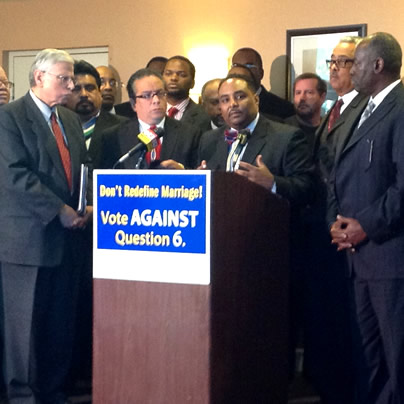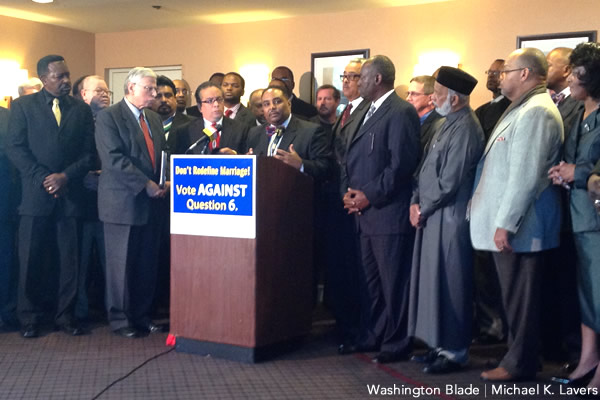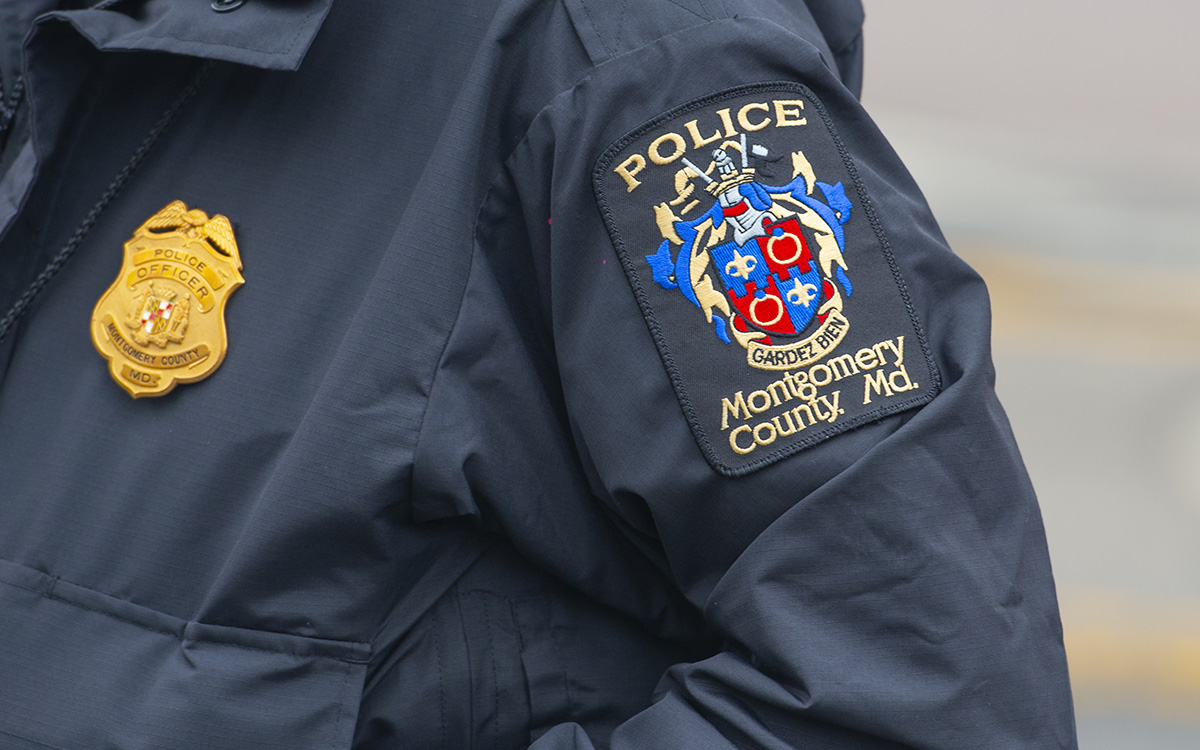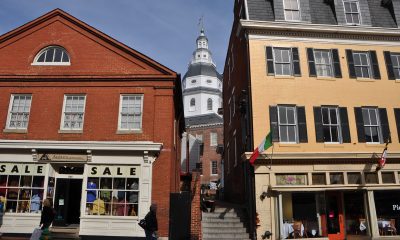Local
Clergy speak out against Md. same-sex marriage law
Religious leaders gathered at Beltsville hotel four days before Election Day


Maryland Marriage Alliance Chair Derek McCoy speaks during Beltsville press conference on Friday with dozens of clergy against Question 6. (Washington Blade photo by Michael K. Lavers)
BELTSVILLE, Md.—Dozens of religious leaders from across Maryland and D.C. gathered in Prince George’s County on Friday to express their opposition to Question 6.
“We’re all here today not because of what we’re against, but because of what we’re for,” said Rev. Frank Reid of Bethel AME Church in Baltimore during a press conference at the Sheraton Washington North Hotel in Beltsville.
He stressed Question 6 opponents have dealt with the issue “very positively” and “tolerantly” without “putting anybody down or calling anybody names.” Reid added there is what he described as confusion going into Election Day.
“The first confusion is this is not just a Question 6 election,” he said. “This is also a presidential election. And there are many who want to confuse us and say that if you vote for this or against this you are voting for or against a certain party or a certain candidate. That is not true. This is a faith and freedom issue and it is possible to vote for a candidate and vote for or against Question 6, so we don’t want any confusion that we are here against one candidate or for another candidate. That is not our concern. Our focus is very clear on Question 6: Vote against Question 6 and then vote for whatever candidate you want.”
Bishop Angel Nuñez of Bilingual Christian Church in Baltimore questioned whether Question 6 will protect religious freedom as Gov. Martin O’Malley, Revs. Delman Coates of Mount Ennon Baptist Church in Prince George’s County and Donté Hickman of Southern Baptist Church in Baltimore and others who support the law continue to maintain.
“It seems like the language in the ballot goes out of its way to convince voters that churches will not be affected. In reality, non-profits, individuals and private businesses are at risk,” said Nuñez. “In the actual law, it is clear that any church that receives state funds is not safe.”
Reverend Pierre Bynum of the Family Research Council argued Catholic Charities was forced to end adoptions in several states because they refused to place children with gay parents. He said more than 60,000 people have signed a petition urging Gallaudet University to reinstate Dr. Angela McCaskill, a senior administrator who remains on administrative leave for supporting the referendum on Maryland’s same-sex marriage law.
“The problem is we’re going to see that over and over and over times thousands,” said Bynum. “Since just this petition went out to give people an opportunity to vote, there’s so many different things that have taken place including all of the people who signed the petition having their names published in a newspaper and getting telephone calls and visits from people who are antagonistic toward them.”
A Goucher College poll released earlier this week found 55 percent of Marylanders support marriage rights for same-sex couples in the state, compared to 39 percent who oppose them. A Baltimore Sun survey conducted between Oct. 20-23 noted only 46 percent of respondents would vote for the law.
Reverend Alfred Deas, Jr., of Metropolitan AME Church in Cumberland disagreed with the civil rights organization’s support of Question 6 and marriage rights for same-sex couples.
“I unfortunately believe that they have stepped out on I believe the wrong side of history,” he said, noting he took part in the 1963 March on Washington with a local NAACP chapter. “It is not a civil rights issue. Gays have not gone through what we’ve gone through. And to compare the two is just wrong.”
The press conference also took place two weeks after Rev. Robert Anderson of Colonial Baptist Church in Randallstown suggested during a town hall meeting on Question 6 that those who practice homosexuality and approve it are “deserving of death.” A California pastor described gay men as “predators” who seek to indoctrinate children during an anti-gay marriage gathering that Family Research Council President Tony Perkins, Maryland Marriage Alliance Chair Derek McCoy, Bishop Harry Jackson of Hope Christian Church in Beltsville and roughly 100 others attended at a Baltimore church on Oct. 21.
McCoy again defended Anderson when the Washington Blade asked him and other assembled clergy to respond to criticisms over what Question 6 supporters maintain is the use of homophobic rhetoric against the law.
“Nobody here endorses violence, endorses bullying of any sort in any stance,” said McCoy. “We stand collectively to love our community, to love the constituents who are in our churches and within our broader community in the state of Maryland.”
He said those who criticized Anderson’s use of scripture to speak against Question 6 misinterpreted his remarks.
“As a matter of fact, we believe when Dr. Anderson was using that, it was taken grossly out of context,” said McCoy.
Pastor John K. Jenkins, Sr., of First Baptist Church of Glenarden in Upper Marlboro acknowledged the church has not previously “responded well to the homosexual lesbian community.” Reid referred to Michael Eric Dyson of Georgetown University who asked on MSNBC shortly after President Obama publicly backed marriage rights for same-sex couples whether those within the black church who oppose the issue want to become “sexual rednecks.”
“That kind of language has no place in America,” he said. “We should be able to disagree without being disagreeable.”
Father Erik Arnold of the Archdiocese of Baltimore, Pastor Anthony Maclin of the Collective Empowerment Group in Riverdale, Jackson and an imam from the Islamic Center of Washington were among those who also attended the press conference.
Maryland
Montgomery County police chief discusses arrest of trans student charged with planned school shooting
County executive tells news conference student’s trans identity is irrelevant to criminal charge

Montgomery County, Md., Police Chief Marcus Jones joined other county and law enforcement officials at a news conference on Friday, April 19, to provide details of the police investigation and arrest of an 18-year-old high school student charged two days earlier with threats of mass violence based on information that he allegedly planed a mass shooting at the high school and elementary school he attended in Rockville, Md.
In charging documents and in a press release issued on April 18, Montgomery County Police identified the arrested student as “Andrea Ye, of Rockville, whose preferred name is Alex Ye.”
One of the charging documents states that a friend of Ye, who police say came forward as a witness who played a crucial role in alerting authorities to Ye’s threats of a school shooting, noted that Ye told the witness that Ye identified as the transgender student he wrote about as a character in a 129-page manifesto outlining plans for a school shooting. Police have said Ye told them the manifesto was a fictional story he planned to publish.
At the news conference on Friday, Police Chief Jones and other law enforcement officials, including an FBI official and Montgomery County Executive Marc Elrich, referred to the student as Alex Ye and Mr. Ye. None of the officials raised the issue of whether Ye identified as a transgender man, seven though one of the police documents identifies Ye as a “biological female.”
County Executive Elrich appeared to express the views of the public officials at the news conference when one of the media reporters, during a question-and-answer period, asked Elrich why he and the others who spoke at the news conferment failed to “admit that this individual was transgender.”
“Because it’s not a lead,” Elrich replied, asking if the press and law enforcement authorities should disclose that someone arrested for murder is “a white Christian male who’s heterosexual.” Elrich stated, “No, you don’t – You never publish somebody’s sexual orientation when we talk about this. Why you are focusing on this being a transgender is beyond me. It’s not a news story. It is not a crime to be transgender.”
The reporter attempted to respond but was cut off by the press conference moderator, who called on someone else to ask the next question.
In his remarks at the press conference Chief Jones praised the so far unidentified witness who was the first to alert authorities about Ye’s manifesto appearing to make threats of a mass school shooting.
“Now, this is a situation that highlights the critical importance of vigilance and community involvement in preventing potential tragedies,” Jones said. “I commend the collaborative efforts of the Montgomery County Police Department, the Federal Bureau of Investigation, the Rockville City Police Department, and the Montgomery County Public Schools, as well as Montgomery County Health and Human Services,” he told the gathering.
“Thanks to their swift action and cooperation a potentially catastrophic event was prevented,” Jones said.
Jones pointed out that during the current school year, police have received reports of 140 threats to the public schools in Montgomery County. He said after a thorough investigation, none of them rose to the level where an arrest was made. Instead, police and school officials took steps to arrange for the student making the threats and their parents to take remedial action, including providing mental health services.
“But this case is different,” Jones said. “This case is entirely different that takes it to a different level. It was a concerned witness who brought this matter to light by rereporting the suspect’s manifesto to the authorities. This underscores the value of community engagement and the ‘see something say something’ approach,” he said.
Jones mentioned at the press conference that Ye was being held without bond since the time of his arrest but was scheduled to appear in court for a bond hearing on Friday shortly after the press conference took place to determine whether he should be released while awaiting trial or continue to be held.
In his manifesto obtained by police, Ye writes about committing a school shooting, and strategizes how to carry out the act. Ye also contemplates targeting an elementary school and says that he wants to be famous.
In charging documents reported on by WJLA 7 and WBAL 11, the 129-page document, which Ye has referred to as a book of fiction, included writings that said, in part:
“I want to shoot up a school. I’ve been preparing for months. The gun is an AR-15. This gun is going to change lives tomorrow … As I walk through the hallways, I cherry pick the classrooms that are the easiest targets. I need to figure out how to sneak the gun in. I have contemplated making bombs. The instructions to make them are surprisingly available online. I have also considered shooting up my former elementary school because little kids make easier targets. High school’s the best target; I’m the most familiar with the layout. I pace around my room like an evil mastermind. I’ve put so much effort into this. My ultimate goal would be to set the world record for the most amount of kills in a shooting. If I have time, I’ll try to decapitate my victims with a knife to turn the injuries into deaths.”
Maryland
Rockville teen charged with plotting school shooting after FBI finds ‘manifesto’
Alex Ye charged with threats of mass violence

BY BRETT BARROUQUERE | A Montgomery County high school student is charged with what police describe as plans to commit a school shooting.
Andrea Ye, 18, of Rockville, whose preferred name is Alex Ye, is charged with threats of mass violence. Montgomery County Police and the FBI arrested Ye Wednesday.
The rest of this article can be found on the Baltimore Banner’s website.
District of Columbia
New D.C. LGBTQ+ bar Crush set to open April 19
An ‘all-inclusive entertainment haven,’ with dance floor, roof deck

D.C.’s newest LGBTQ+ bar called Crush is scheduled to open for business at 4 p.m. on Friday, April 19, in a spacious, two-story building with a dance floor and roof deck at 2007 14th St., N.W. in one of the city’s bustling nightlife areas.
A statement released by co-owners Stephen Rutgers and Mark Rutstein earlier this year says the new bar will provide an atmosphere that blends “nostalgia with contemporary nightlife” in a building that was home to a popular music store and radio supply shop.
Rutgers said the opening comes one day after Crush received final approval of its liquor license that was transferred from the Owl Room, a bar that operated in the same building before closing Dec. 31 of last year. The official opening also comes three days after Crush hosted a pre-opening reception for family, friends, and community members on Tuesday, April 16.
Among those attending, Rutgers said, were officials with several prominent local LGBTQ organizations, including officials with the DC Center for the LGBTQ Community, which is located across the street from Crush in the city’s Reeves Center municipal building. Also attending were Japer Bowles, director of the Mayor’s Office of LGBTQ Affairs, and Salah Czapary, director of the Mayor’s Office of Nightlife and Culture.
Rutgers said Crush plans to hold a grand opening event in a few weeks after he, Rutstein and the bar’s employees become settled into their newly opened operations.
“Step into a venue where inclusivity isn’t just a promise but a vibrant reality,” a statement posted on the Crush website says. “Imagine an all-inclusive entertainment haven where diversity isn’t just celebrated, it’s embraced as the very heartbeat of our venue,” the statement says. “Welcome to a place where love knows no bounds, and the only color or preference that matters is the vibrant tapestry of humanity itself. Welcome to Crush.”
The website says Crush will be open Tuesdays and Wednesdays from 4 p.m. to 12 a.m., Thursdays from 4 p.m. to 2 a.m., Fridays from 4 p.m. to 3 a.m., Saturdays from 2 p.m. to 3 a.m., and Sundays from 2 p.m. to 12 a.m. It will be closed on Mondays.
Crush is located less than two blocks from the U Street Metro station.
-

 District of Columbia2 days ago
District of Columbia2 days agoReenactment of first gay rights picket at White House draws interest of tourists
-

 District of Columbia2 days ago
District of Columbia2 days agoNew D.C. LGBTQ+ bar Crush set to open April 19
-

 Arizona2 days ago
Arizona2 days agoAriz. governor vetoes anti-transgender, Ten Commandments bill
-

 Africa4 days ago
Africa4 days agoUgandan activists appeal ruling that upheld Anti-Homosexuality Act












